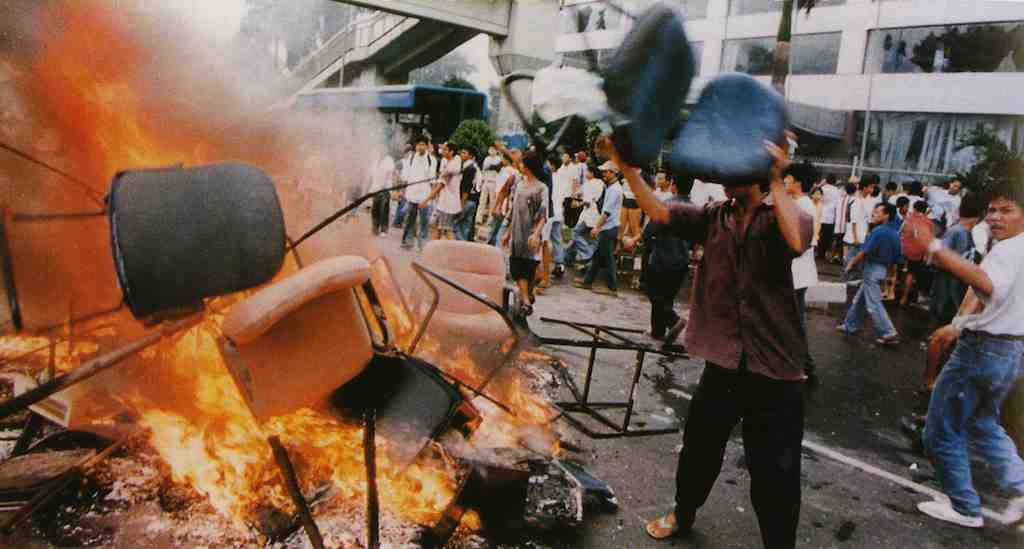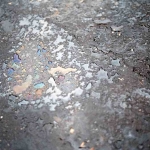Author’s note: This is a short historical fiction about May 1998 riot, which I wrote for my Creative Writing class. It’s loosely based on the accounts that the victims share in various Indonesian forums.
Lina sat down on the edge of the couch in front of me and adjusted her position three times, as if the cushion was made out of unpolished wood. Her medium, black hair was tied into a ponytail, and from what I’ve heard, she refused to wear any make-up, despite the insistence of my director.
‘When I tell my story, I want to look like me,’ I heard Lina say. She turned away quickly before an argument ensued, and stood before me.
Lina averted her eyes as I welcomed her. Her hand was soft, but it was icy cold. I offered her tea.
‘Black, please,’ she said.
She fidgeted when we made small talk – about her new job as an accountant, about her morning walk routine to the market, and when she didn’t seem to offer more conversation topics, about the weather.
She sat in silence, and I opened my mouth and closed it again for the fourth time, not really sure what to talk.
My director approached us. She sighed, admitting her loss in the make-up argument, and flipped through the papers in her hands. She gave a small nod. ‘Let’s get started,’ she said.
Lina straightened her sitting position and looked at me in the eyes. I was tempted, very tempted to look away, but I didn’t. I couldn’t. I shouldn’t. She inhaled as much as her lungs allow, and paused.
‘I saw my sister die,’ she said. ‘It is not something you forget.’
Jie was sixteen; I was seven. Pa owned an electronic shop nearby; Ma helped. We had just moved to a new place – a two-bedroom apartment but it was the size of one. The building had twenty-one levels, and the one we were on was level four, no matter how hard Ma pleaded to the building manager not to be there. I think he gave us that floor out of spite. Yes, he did. I remember the way he smirked when Ma looked down and shook her head, trying to control her raspy breathing.
Four is the unlucky number. Four is si, and si means death. Both Jie and I didn’t think much of it, and after hours stranded on the roadside, breathing dust and sweating hard, Pa decided to take it.
Unit four-one-seven. Four is the number of death.
At least to us Chinese, it is.
‘Tionghoa babi!’ That was what the natives called us – pigs. We had been there for decades and we knew for sure that we were not welcomed. We had our own suburbs – our own ‘Chinatowns’. All my classmates were Chinese. At that time, I couldn’t recall knowing someone who didn’t share the same race. We had coexisted for so long by tending to our own business, but the resentment was there. I guess no one wants to see their homeland being ‘home’ to immigrants who manage to prosper more than them.
Pa had prospered. He ran a shop at Roxy, the place where everyone went to look for electronics. I was five when we moved to our three-storey house. It was located on the corner of the street, and our garden was L-shaped. I had three rabbits: Brownie, Blacky and Beauty. I had my own bedroom – the walls were sky blue and sun yellow. My three-door wardrobe was painted in soft pink, light blue and lime green. I slept in a double bed. I had more Barbie dolls than I could count, more poly pockets than I could have played with. And I had Jie.
Jie and I walked home from school one day to see a huge truck in front of our house. We walked inside and half of the furniture was gone. Ma walked up and down the stairs, putting more things on cardboard boxes. Pa was on the phone all the time. Ma said we were moving to a new place, and I didn’t know until later that Pa’s business partner had cheated his money and ran away.
One night at our new home, Pa sat down for dinner, but he wasn’t eating. I could see the blue-purple veins on his arms. He looked older. His skin was darker. Pa stared blankly at his folded hands and we ate in silence. I stood to bring my empty plate to the sink, and Pa suddenly looked at me. ‘Remember, Xiao Mei,’ he said with a hoarse voice, ‘you can’t trust people too much.’ Ma rushed to cup her hands on my ears and told me to go to my room. Jie said we could play throwing coins, but before closing the door, I could see Ma wrapping her arms around Pa, his head lying on her chest. They were both crying.
Selling the last of Ma’s gold necklaces – their wedding gifts from my grandparents – Pa opened another store, just like the one in Roxy, but smaller, much smaller. Jie and I used to play hide and seek in his shop, but in his new one, there was no place to hide.
That day, Jie and I didn’t go to school. We hadn’t been going for days. ‘It’s just a precaution,’ Ma said. ‘Everything will be okay.’ But she wasn’t sure. She stayed at home, instead of helping Pa to run the shop. Jie and Ma used to peek out of the window, trying to locate something in the distance when there was nothing there. Whenever I went to join them, they pulled me from the window and walked towards the kitchen. They jolted when we heard a loud voice. Jie read me stories from the books, but at times she would suddenly stop, as if thinking hard of something else.
At night, we didn’t turn on the lights and used the candles instead. We slept together in one bedroom, but we didn’t sleep well. Mosquitoes buzzed in my ears, and covering myself with a blanket was unbearable; it was so hot. Occasionally, I heard a ruckus outside, but Jie would sing to me, drowning down the noise.
That day, Pa went to his shop. It was midday when he came back. Pa’s blue shirt was drenched in dirt and sweat. He looked straight at Ma.
‘The rioters are here,’ he said.
Ma opened her mouth, but Pa answered before she asked, ‘A dozen, at least. They ransacked the shop. We need to go to the upper levels. Now.’
Ma began to cry, but subdued her sob with her right hand. Jie knelt and put her hands on my shoulders. ‘We’re just going upstairs. Do you want to bring Ling?’ Ling was my favourite rabbit doll. I nodded.
‘Shh,’ Pa put his forefinger to his lips. He slowly opened our apartment door, and someone screamed. The voice came from below. Jie held my hand tight, and we tiptoed towards the emergency stairs.
One floor. Two floors. Three. I wanted to cry, just like when I fell off the swing and hurt my knee, but I couldn’t. Jie squeezed my hand until it hurt. Ma was behind us, still trying to control her sobs by taking deep breaths. Pa led the way.
Stairs later, we realised that someone had opened the access door. ‘Those scum are up there. This way! This way!’
Pa lifted me up and we ran.
As we heard their footsteps approaching, Pa decided to go back to the corridor. He supported my weight with his left hand, and banged at each door with his right. Thirteen-zero-two. Thirteen-zero-four. Thirteen-zero-six. He banged harder each time, shouting, ‘Help, please, help!’
No one did.
Men stood from where we had come. They were panting, and we ran to the other end. I could see black smoke rising from the window. A car was burned. Pa handed me over to Jie and raised his arms to protect us. Jie shielded my eyes with her hand, but in between her fingers I could see three men holding charred, rectangular blocks of wood. And for all it was worth, Jie couldn’t shield my ears.
I heard Pa scream, then Ma. Jie pinned me to the ground, gesturing me to hide in the cavity between a fire hydrant and the corner wall. She distracted the dark-skinned man coming at her, biting him in the arm. I crawled inside, still hugging Ling. I closed my eyes and counted to ten. I let go of Ling and covered my ears instead. I counted on.
When I finally opened my eyes, the world was silent. I crawled out slowly and saw Ma sitting by the wall, her clothes torn and tainted with blood. Her eyes were open, but they were distant. Somehow, I knew she was lost. Pa laid down on the floor next to her, and blood pooled by his forehead.
There was a trail of blood up to two doors away, and Jie was there. Her eyes were closed. Like Ma, her clothes were ripped and bloody. Her head rested on her left arm, blood dripping from the tips of her fingers. Patches of her long, black hair were gone. Her legs were parted, bending at a weird angle.
I walked towards her and stopped. My eyes were scanning her body to find an undamaged spot, but there wasn’t. The air smelled like my hand after playing at the old swing set after school. Rusty. Metallic. But this time, the air was suffocating.
Jie, who sang, ‘Xiao bao bao, kuai kuai shui jiao,’ until I fell asleep. Jie, who tickled my stomach until my eyes were teary. Jie, who tied my shoes on my first day of school. Jie was gone.
I screamed.
‘It’s been seventeen years since we came here,’ Lina said. ‘Pa was hospitalised for five weeks. Ma for three. Our relatives helped us with everything. The funeral. The joss paper burned for Jie. They paid for the plane tickets. Pa’s sister was living here, so we were lucky.
‘They sent us here to forget, but I remember. I still see it in my dreams: the blackened buildings with windows shattered, the burned cars on the street. I see Nai Nai sobbing beside Jie’s coffin. I see Pa, beaten. I see Ma, broken. I see Jie.
‘The newspaper said that during those–,’ Lina swallowed. ‘Those dark days, there were a thousand people burned to death.
‘And one hundred Tionghoa girls were raped.
‘That was a lie. There were much more.’
Lina straightened her sitting position. She curled her hands into fists. ‘Everyone tells us to forget,’ she said. ‘They tell us to forgive. “It’s in the past. Nothing good can come from bringing back the past.”
‘But forgiving means accepting what they did. Forgetting means tolerating.’
After a long silence, my director decided it was enough. I forced myself to look at Lina, saw the lines stretched on her face and reached out for her hand.
‘Thank you,’ I said, ‘for telling your story.’ I squeezed her hand a little, uncertain how to show my sympathy.
It took some time, but she smiled. ‘Thank you,’ Lina said, uncurling her hands. She rose from her chair, but stopped. Peering over her shoulder with her eyes looking down, she said, ‘Thank you for refusing to forget.’
Lina walked away from the set. I sat there, watching her shadow diminish, trying to remember where I had been on May fourteenth, nineteen ninety-eight.
Photo by Office of the Vice President The Republic of Indonesia (B.J. Habibie: 72 Days as Vice President) [Public domain], via Wikimedia Commons










